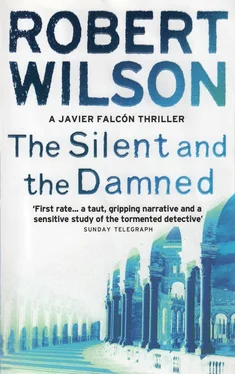'You're always on your own with mental illness,' said Falcón.
'She has a box of her favourite videos and DVDs. All romantic stuff. There's a DVD still in the machine. She gets the call from her neighbour so the child is taken care of. She has no responsibilities. When did her husband get home?'
'I'm told it was normally quite late… around midnight.'
'That would fit: put off coming home to the despair for as long as possible,' said Ferrera. 'Sra Vega probably didn't like seeing him anyway. She heard the car… or maybe not through these windows. So she more likely heard him come into the house from the garage. She turned off the DVD and ran upstairs leaving her slippers. He eventually joined her in bed, or at least…'
'How do you know he joined her? His pillow was undented in the crime scene shots.'
'But the sheets and covers were pulled out… so he might have been about to join her…'
'And then been distracted by something else.'
'Do we know from the phone company if there were any more calls after the neighbour rang about the child?'
'Not yet. You can work on that when we get back.'
'The only other oddity I've come across is that in the crime scene photographs he's got his watch on with the face on the outside of his wrist, but in the photos I've seen elsewhere in the house he always wore it with the face on the underside of his wrist.'
'What do you conclude from that?'
'It either worked its way round in his struggle with himself or an assailant,' said Ferrera, 'or the watch has come off and been put back on his wrist by somebody who doesn't know how he wears it.'
'Why would someone want to do that?'
'Well… if it came off as a result of a struggle with an assailant whose ultimate aim was to make this look like a suicide it would be less indicative of another person's presence if the watch was on his wrist rather than on the floor.'
'What sort of a strap did his watch have?'
'It seems to be a metal bracelet type, which can come off easily in a struggle or just as easily work its way round a wrist, so
'Whatever… that was a good piece of observation,' said Falcón. 'It might not help us form a case for murder, but it is indicative of the strange circumstances of the crime scene. Now all we've got to do is find the incontrovertible proof that will convince Juez Calderón that we have a case. We know Sr Vega was burning things at the bottom of the garden. What does that imply to you?'
'He was getting rid of things in preparation for something.'
'They were personal things, letters and photographs, and they caused him great distress.'
'So he didn't want them discovered. He was hiding them and now…'
'If you were Sr Vega and you wanted to hide something, where would you put it?'
'In my territory – either here in my study or in the butcher's room.'
'I've searched the study,' said Falcón.
They went into the butcher's room. Ferrera turned on the harsh neon lights and Falcón walked around the wooden chopping block putting on latex gloves. They opened up the first freezer cabinet and he started taking out the blocks of meat. When all the meat was out of the cabinets Ferrera crawled into the dark frozen holes with a pen torch in her mouth and a knife to scrape away at the frost on the sides of the freezers. At the back in a corner of the second freezer she found what they were looking for. A plastic package encrusted in ice. She passed it out. They returned the meat to the cabinets.
The package was a small freezer bag with a wire twist at its neck. Inside was an Argentinian passport issued in Buenos Aires in May 2000 in the name of
Emilio Cruz. The photo was of Rafael Vega in a pair of old-fashioned heavy-framed glasses. There was also a single key with no label.
This was an escape route,' said Falcón. 'What are the implications of that?'
'Well, if he had an escape route into the life of Emilio Cruz,' said Ferrera, 'then he'd probably already escaped into the life of Rafael Vega.'
'So we now check Vega's ID card right back to its original issuing office,' said Falcón.
Thursday, 25th July 2002
In Consuelo Jiménez's office they sorted through her husband's old photos, finding ones that included Pablo Ortega and/or Rafael Vega. They headed out of the old city to Dr Rodríguez's surgery, which was in a barrio next to Nervión. On the way the Médico Forense called Falcón to say that the autopsies were complete and both bodies ready for identification. Ferrera called Carmen Ortiz and told her to prepare herself to go down to the Institute Anatómico Forense.
Dr Rodríguez was running late and Falcón sat down with El Pais. He skimmed past a photo of six drowned Moroccans on the beach at Tarifa, victims of another failed attempt to get into Europe. His eye settled on an article about the trial of Slobodan Milosevic at the International Criminal Tribunal in the Hague, or rather a sidebar which was giving an update on a strange continuing phenomenon. Since the beginning of July, when the Rome Statute of the permanent International Criminal Court had entered into force, the Americans, for reasons that were not clear, had been persuading governments who had signed the treaty to declare that they would not press or put up for trial any US citizen for prosecution by the ICC. They gave a list of the countries wavering under American pressure but no more information. The nurse called him in to Dr Rodríguez's consulting room.
The doctor was in his late thirties. He dried his hands on paper towels while inspecting Falcón's credentials. They sat. Falcón told him of Sr Vega's death. The doctor pulled up Vega's file on the computer.
'On 5th July this year you had an appointment with Sr Vega,' said Falcón. 'As far as I can tell, that was the only time you saw him this year.'
'It was the only time ever. He was a new patient. His records came to me from Dr Alvarez.'
'His diary showed that he had an appointment with a Dr Diego before he came to you.'
'The notes came from Dr Alvarez. Maybe he saw a Dr Diego and decided that he wasn't right for him.'
'Was there any indication from the consultation or the notes sent to you by Dr Alvarez that Sr Vega was suicidal?'
'He had some hypertension, but nothing catastrophic. He was suffering from anxiety and he described a number of incidents which sounded like classic panic attacks. He assumed the cause was from pressure of work. According to Dr Alvarez's notes he'd been suffering mild anxiety since the beginning of the year, but it wasn't sufficiently serious to prescribe anything.'
'Did Dr Alvarez mention that Sr Vega's wife had an advanced mental illness? She was taking lithium.'
'He didn't, which I presume means he didn't know about it,' said Rodríguez. 'That would certainly have contributed to Sr Vega's stress.'
'Do you know why Sr Vega stopped seeing Dr Alvarez?'
'There's nothing specific in the notes, but I noticed that Dr Alvarez had been recommending some psychological therapy. When I put this to him myself he was very resistant to the idea, so it's possible they had a disagreement about that.'
'So the mild anxiety was probably developing into something more serious and he was hoping for a different approach from you?'
'My approach was to reduce his anxiety with a mild drug and then, when he was feeling more in control, persuade him into some form of therapy.'
'Did he talk about any sleep problems?'
'He mentioned a sleepwalking incident. His wife had woken up at three in the morning to see him leaving the bedroom. When she questioned him about it the next day he had no recollection of it.'
'So he did talk about his wife?'
'When describing that incident, yes, but he also said his wife could not be relied upon because she took sleeping pills. There was something else that had happened, which had convinced him that the sleepwalking had occurred, but he wouldn't be drawn on it,' said Rodríguez. 'It was the first consultation, remember. I thought there would be time to coax things out of him later.'
Читать дальше
Конец ознакомительного отрывка
Купить книгу












